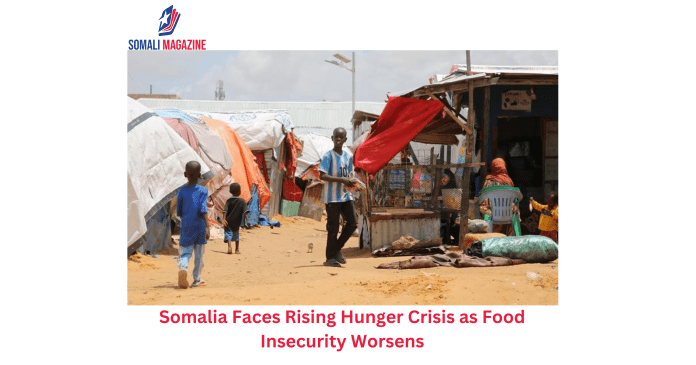Facebook Twitter Instagram Somali Magazine - People's Magazine
Millions in Somalia at Risk as Drought, Poor Harvests, and Funding Shortfalls Threaten Livelihoods
In 2022, an East African country was on the brink of famine, but thanks to increased humanitarian aid, the worst was avoided. However, food insecurity is rising again, with 3.4 million people already struggling to get enough to eat. This number is expected to increase to 4.4 million between April and June, making up nearly a quarter of the country’s population.
Food insecurity is classified using a system called IPC, which ranks hunger levels from one to five. Level three represents acute hunger, level four is severe acute malnutrition, and level five is famine, the most extreme stage.
The World Food Programme (WFP) has reported that 1.26 million children under five need urgent help. Among them, 466,000 are expected to suffer from severe acute malnutrition this year, putting them at serious risk of death.
WFP spokesperson Jean-Martin Bauer, speaking from Rome, emphasized that Somalia’s past experiences have shown that delays in aid can be fatal. He urged donors and partners to provide more funding to help the country’s 19 million people.
Last year, two failed crop seasons caused harvests to drop by 45% below normal levels. This happened due to repeated climate shocks, including low rainfall that dried up water sources and led to massive livestock deaths.
Weather experts predict another drought from April to June. At the same time, humanitarian organizations warn that malnutrition rates will likely worsen because of disease outbreaks and limited access to food.
Out of the $1.4 billion needed for Somalia’s overall aid appeal, only 12% has been funded so far, according to Mr. Bauer.
The WFP provides up to 90% of Somalia’s food assistance, playing a crucial role in helping those in need, including people displaced by conflict. To combat the crisis, both direct food aid and cash-based transfers are required. These efforts ensure that families receive food packages, shelter, and essential supplies.
“When faced with a crisis like this, we need all possible resources to prevent a disaster,” Mr. Bauer stressed.
With the situation worsening, urgent action is needed to help the millions of people at risk of hunger and malnutrition.

